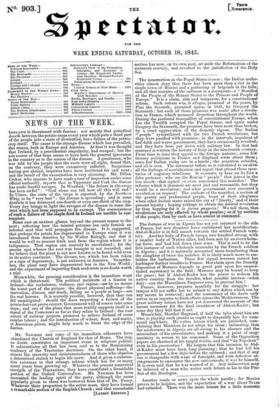The insurrection in the Papal States is over : the
Italian autho- rities almost deny that there has been more than a riot in the single town of Rimini and a gathering of brigands in the hills; and all that remains of the outburst is a document—a " Manifest of the People of the Roman States to the Princes and People of Europe." It is a claim, able and temperate, for a constitutional reform. Such reform was, it alleges, promised at the peace, by Pius the Seventh ; promised again, in 1831, by Gregory the
Sixteenth : but each of those promises was made after a revolu- tion in France, which menaced despotism throughout the world. During the profound tranquillity of constitutional Europe, when Leo the Twelfth occupied the Papal throne, and again under Gregory the Sixteenth, the promises have been more than broken, by a cruel aggravation of the despotic rigour. The Italian " people " sympathized with the two French revolutions, but they were pacified with promises : in the intervals, impatient of bad faith and worse government, they have occasionally revolted; and they have been put down with military law, In that last sentence is written the history of Italy in the nineteenth century. From time to time they appeal to the foreign nations • some few literary politicians in France and England write about them ; some few Italian exiles are in a bustle ; the sensation subsides, and all is over. The document before us is calculated to awaken all the feelings of mortification and regret that attend these spec- tacles of nugatory rebellions. It consents to bear on its face a false pretence : who are the Roman " people" that joined in the late revolt—that signed or even sanctioned this manifest? The reforms which it demands are most just and reasonable, but they would be a revolution ; and what government ever executed a revolution on request? The authors of the manifest, a section of the gentry and professional people, boast of their allegiance when other Italian states raised the cry of " liberty," and of their present loyalty ; hoping perhaps to obtain the desired revolution by thus begging for it in forma pauperis! We tell them, that revolutions are only effected by whole peoples ; or if by sections of the people, then by such as have armies at command.


























